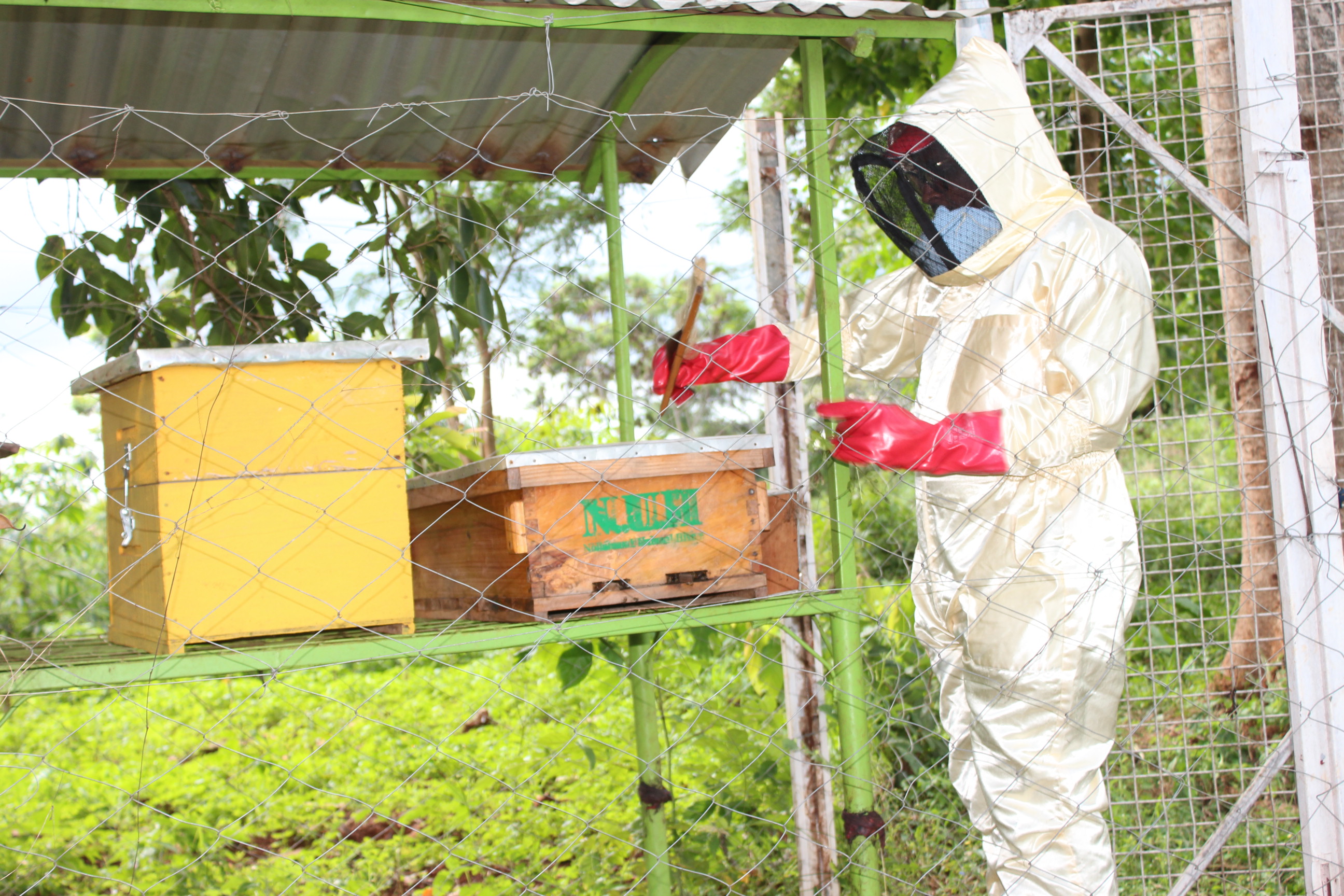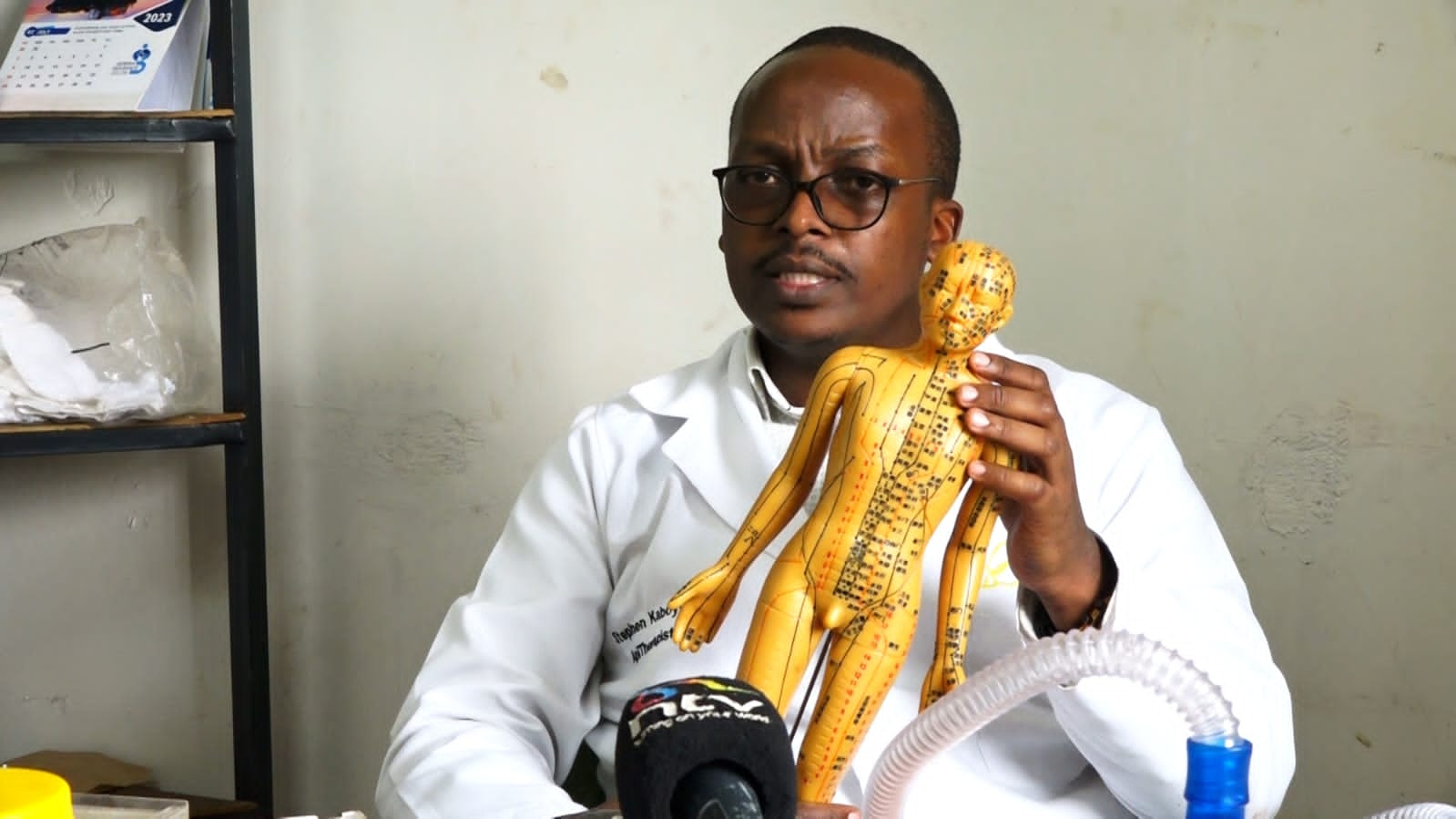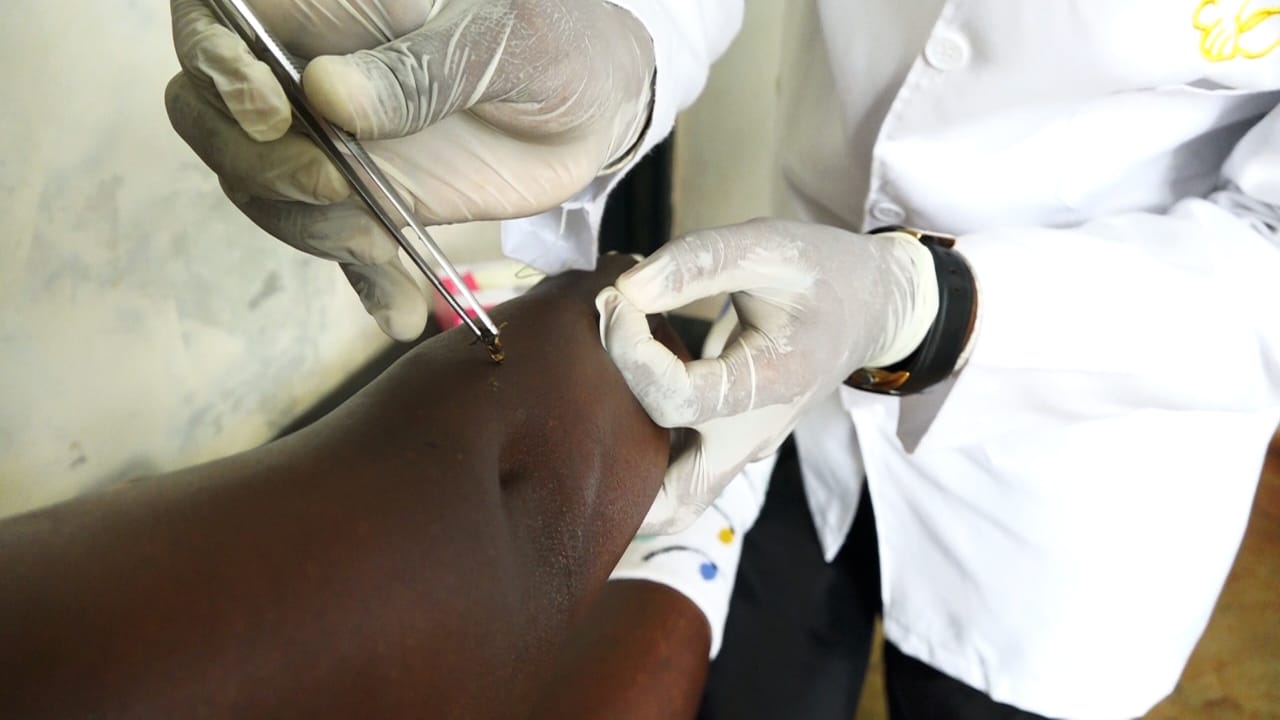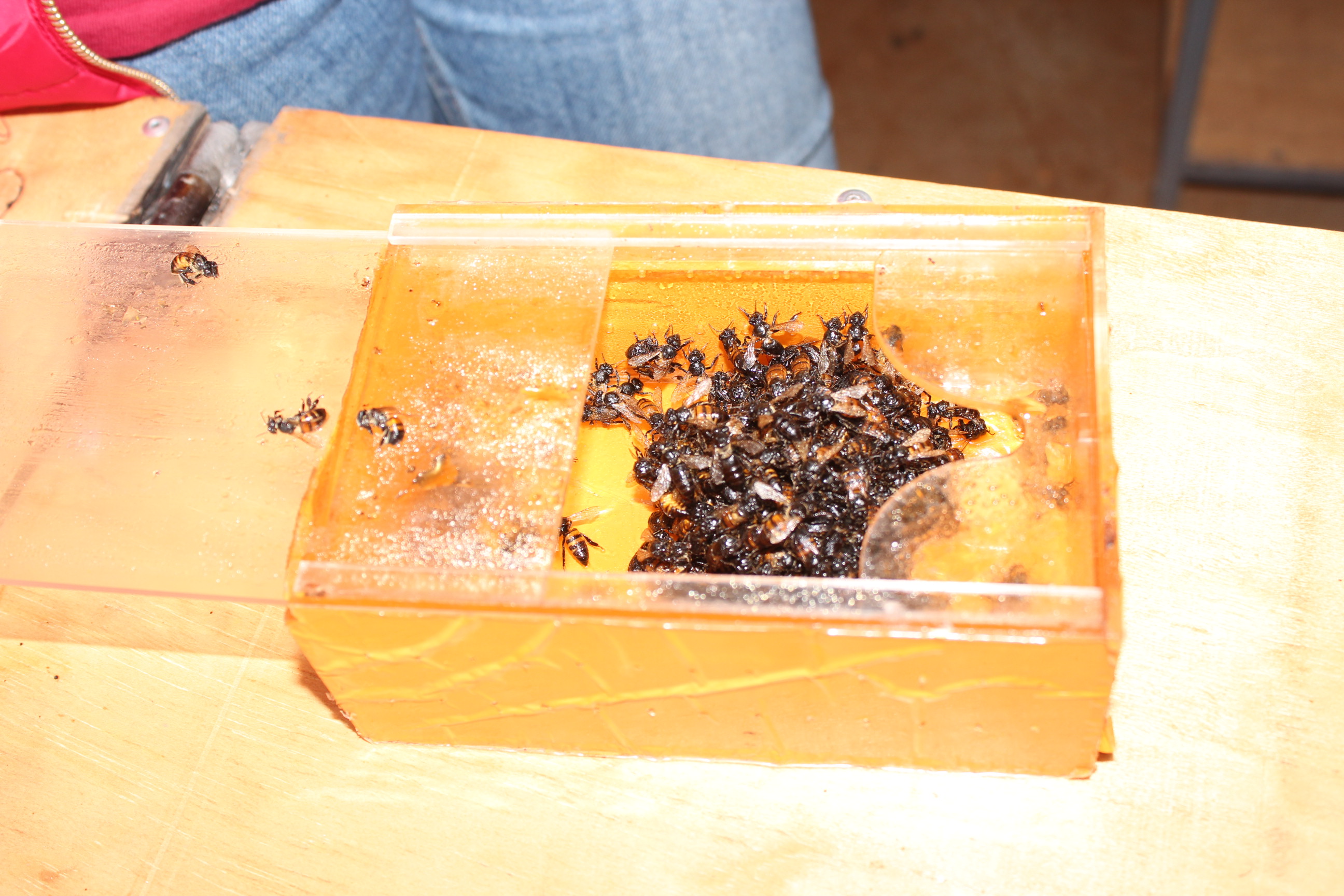
 Steven Kimani is working on one of his 150 bee hives at his apiary./KNA
Steven Kimani is working on one of his 150 bee hives at his apiary./KNA
In the sleepy rolling hills of Kandara, Murang’a County, a buzzing innovation is taking root.
From far and wide, visitors stream into the apiculture centre, to seek healing from natures oldest chemists- the honey bees.
It’s an unusually warm afternoon in July when KNA visits Steven Kimani’s apiculture centre and the place is buzzing with activity, literally.
Outside a make-shift tent, several visitors wait in line patiently for their turn to get the magical healing bee sting.
Metres away, another group of customers stream in and out of a well-stocked farm shop, with four attendants behind the counter.
Some came to buy raw honey, others propolis bee extract, bee pollen, beauty products from honey, while others came by to drink dawa- a honey blended concoction known for treating colds and boosting immunity.
“I graduated with a degree in Civil Engineering from Moi University in 2010 and after working for a while, I ditched the trade in 2015, before jumping into the murky waters of entrepreneurship,” says 38-year-old Kimani, founder and proprietor of the Bella Apitherapy Centre.
 Steven Kimani explains the 13 acupuncture points used in apitherapy./KNA
Steven Kimani explains the 13 acupuncture points used in apitherapy./KNA
“One day, I found a bee pollinating an avocado tree and it sparked my interest in beekeeping but my initial thought was just to sell honey,” he says
To deepen his knowledge about bees, he undertook a certificate course in bee-keeping and got to know the many other bee products and their benefits and was surprised to know that bee-keepers rarely get sick.
"This told me there was something about bee venom from the stings or the bee products and this fueled my curiosity further".
Kimani would then enrol for an Apitherapy course in Romania before undertaking an advanced beekeeping course with a Dutch company.
Armed with technical knowledge and sheer determination, he set up an office in the capital Nairobi, before relocating to the current location-Kandara.
 An apitherapist administering bee stings on a patient at an apitherapy centre in Kandara./KNA
An apitherapist administering bee stings on a patient at an apitherapy centre in Kandara./KNA
“Other bee products include bee venom, bee wax, propolis, honey, bee pollen, bee bread, royal jelly, bee drone larvae and bee hive air,” he says.
Apart from the products, his main area of expertise became the apitherapy branch of alternative medicine that uses products from bees for healing and wellness.
The apitherapist notes that bee venom is one of the numerous bee products and has been proven to manage several conditions, including pain relief, anti-inflammatory effects, immune system support, wound healing and relieving skin conditions such as eczema and psoriasis.
“When a client first gets here, we sting them once on the hand to test whether they are allergic to bee pollen. If they are, we put them on antihistamines and discontinue the treatment,” he adds.
"The body has 13 acupuncture points that when stung with bee venom, are able to heal specific body parts or organs".
Bee venom therapy has ancient roots and was used in Egypt in 2000 BC, ancient Greece in 460 BC and in traditional Chinese medicine over 2,000 years ago to stimulate healing for joint pain and inflammation.
In the 19th century, researchers started studying bee venom more formally in Europe in the 1930s, and bee venom injections started gaining popularity.
Today, bee venom is used in complementary medicine for arthritis, chronic pain, autoimmune disorders, skin conditions and neurological diseases.
 Bees placed in a container for use at the Bella Apitherapy centre in Kandara./KNA
Bees placed in a container for use at the Bella Apitherapy centre in Kandara./KNA
One such person is Mercy Wairimu, 48 years old. She arrived at the centre as we got in and has been patiently waiting for her turn to get the bee sting.
She had travelled from Githurai 45 Estate in Kiambu County to have bee venom therapy at the Bella Apitherapy centre for her arthritic feet condition.
“I started experiencing pain on my back years ago when my daughter, now in high school, was at lower primary level, and the pain would come and go, and my life went on normally.”
She explains that she got concerned when the pain started moving downwards to her feet and settled at the back of her knees, and became persistent.
“I visited a hospital and after numerous tests, I was diagnosed with arthritis. I was given medicine, but the pain was always there and became worse during cold seasons,” she says
Her condition was aggravated by her occupation as a market trader that sees her works till late hours and wakes up extremely early.
She invested in leg-warmers and warm clothes, but the pain persisted, making her dependent on painkillers.
Early this year, her feet started swelling, slowing her down and worsening the pain to the extent that doctors had to extract built-up fluid.
Two months ago, as she sat at her stall in pain, other traders noticed her prolonged silence and sought to establish what was bothering her.
“I told them I was in too much pain and that I suffered from arthritis, which had made my walk slow. One told me she had earlier suffered from the condition and managed it using bee venom, and referred me to this centre,” says Wairimu, a ray of hope flashing in her eyes.
“This is the fifth dose of the bee stings, three on each knee, and the swelling has gone down significantly. I have also not taken pain killers since,” she said, showing off her slightly swollen feet that she had covered in a long skirt.
“The bee stings are painful, but cannot be compared to the pain I have borne for years. I visit the centre twice a week for three months,” she says.
Kimani observes that when he started providing apitherapy services, the reception was mixed with some people doubting it's efficacy, while those with chronic conditions were more willing to try it out.
"I have tended to clients with serious cases of arthritis who are more than willing to try the bee stings because the pain they are in is too much," he says, adding that, "Some elderly people knew that bee venom was used by our ancestors to manage health conditions and were more open to it".
Despite this, the centre has seen a steady rise in clients, with between 25 to 40 people streaming into the facility daily for therapy, where he charges Sh1000 fee per session.
He says that bee venom is instrumental in boosting immunity as it causes the body to produce antibodies that help fight diseases.
Many have reported a positive improvement since starting the therapy, he said, underscoring that apitherapy is a complementary form of medicine that can be applied together with conventional medication.
John Chomba, a 63-year-old apitherapy patient, told KNA that he has been stung by bees over 30 times. A throat cancer survivor, he says his stiff limbs have become flexible and the extreme pain is gone
"I could not move before then. I had to be taken to the toilet but now I can do light duties and even go to the farm," he said, excitedly revealing that he recently pruned his bananas, a testament that the apitherapy is working.
He says he no longer feels pain when the bees sting him and always looks forward to therapy sessions nowadays.














